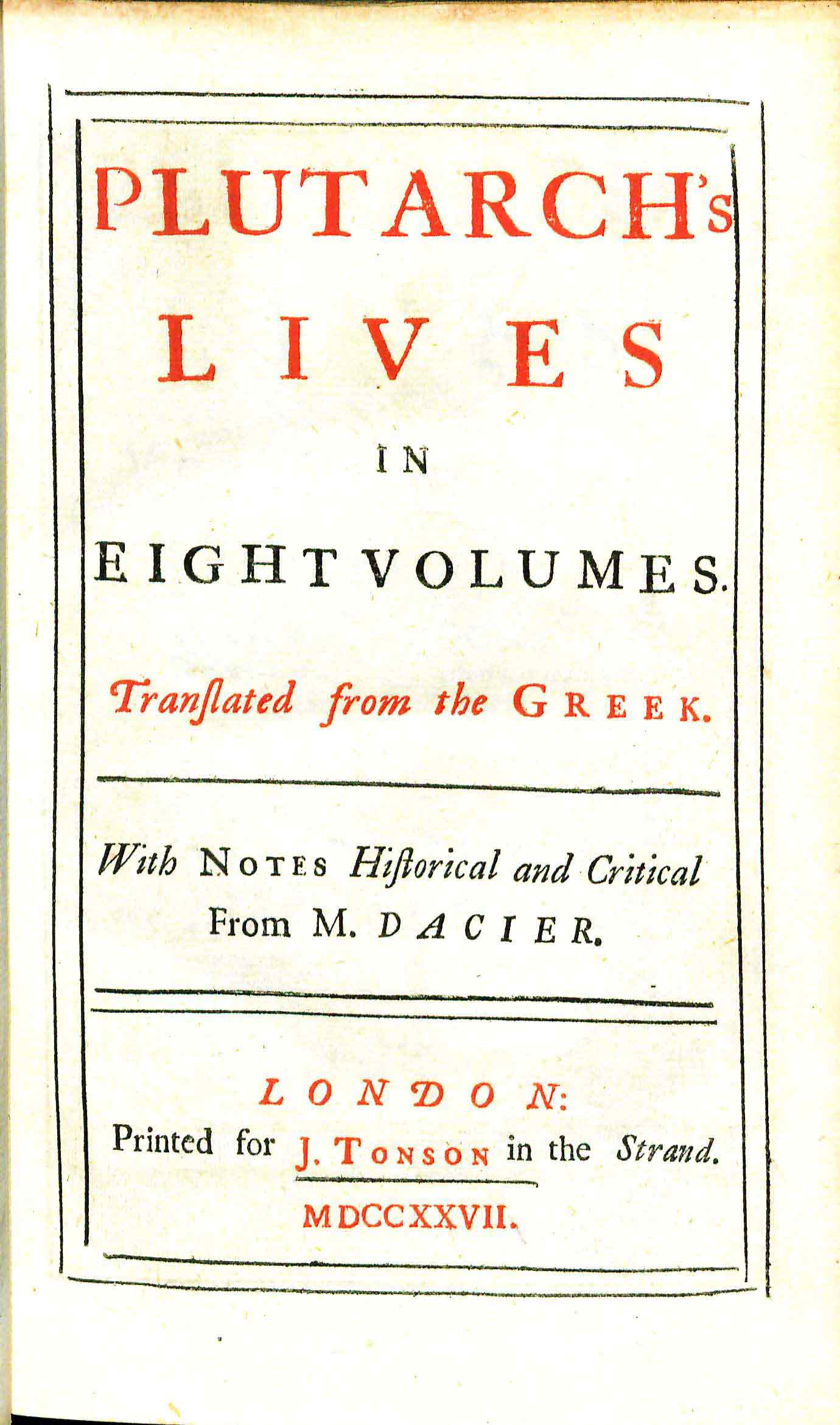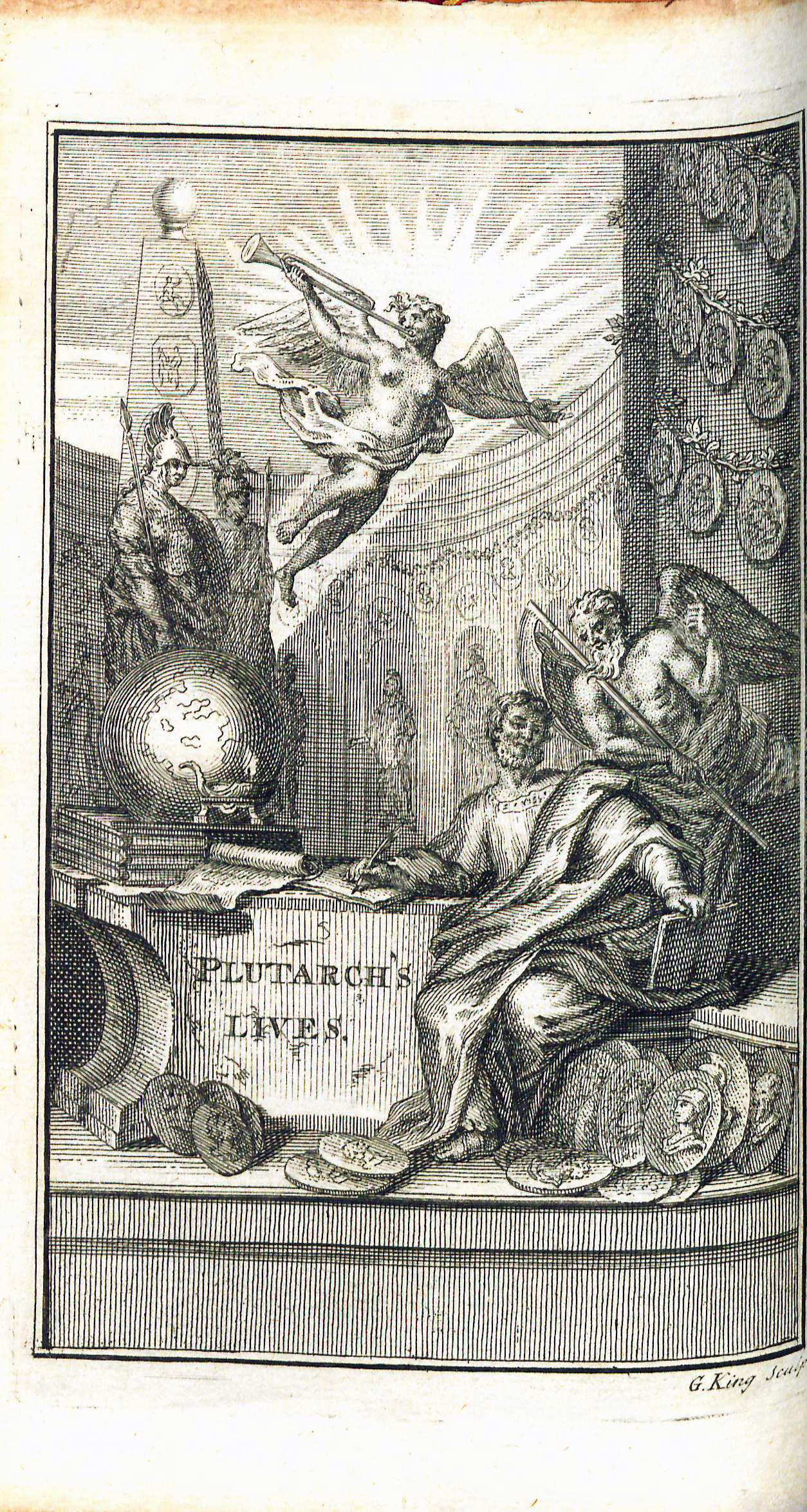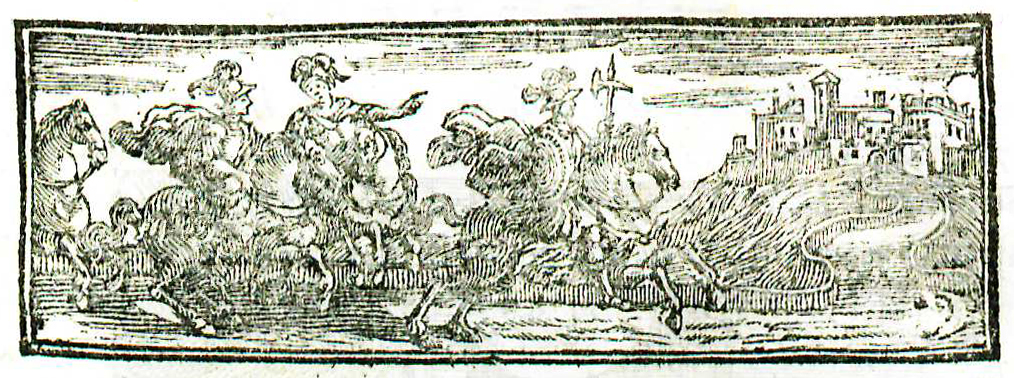Difference between revisions of "Plutarch's Lives"
| Line 15: | Line 15: | ||
|set=8 | |set=8 | ||
|desc=8vo (20 cm.) | |desc=8vo (20 cm.) | ||
| − | }}[[File:PlutarchLives1727v1Frontispiece.jpg|left|thumb|250px|<center>Frontispiece, volume one.</center>]][http://en.wikipedia.org/wiki/Plutarch Plutarch] (ca. 45–120)<ref>George Karamanolis, [http://plato.stanford.edu/entries/plutarch/ “Plutarch”] in ''Stanford Encyclopedia of Philosophy'', accessed October 1, 2013.</ref> was a biographer, philosopher, and ethicist | + | }}[[File:PlutarchLives1727v1Frontispiece.jpg|left|thumb|250px|<center>Frontispiece, volume one.</center>]][http://en.wikipedia.org/wiki/Plutarch Plutarch] (ca. 45–120)<ref>George Karamanolis, [http://plato.stanford.edu/entries/plutarch/ “Plutarch”] in ''Stanford Encyclopedia of Philosophy'', accessed October 1, 2013.</ref> was a biographer, philosopher, and ethicist born in Greece into a Greek family. The government and culture of his upbringing were dominated by Rome, and he would eventually become a Roman citizen, taking the name “Lucius Mestrius Plutarchus.” He spent the majority of his life in [http://en.wikipedia.org/wiki/Chaeronea Chaeronea], Athens, [http://en.wikipedia.org/wiki/Delphi Delphi], and Rome.<ref>Robert Lamberton, ''Plutarch'' (New Haven: Yale University Press 2001), 1–6.</ref><br /> |
<br /> | <br /> | ||
| − | Plutarch’s most famous and influential work is | + | Plutarch’s most famous and influential work is ''Lives'' (often called ''Parallel Lives'' or ''Plutarch’s Lives''). The work is more than just historical, as it seeks to compare the parallel lives of famous Greeks and Romans and thereby synthesize a greater philosophy or wisdom about life.<ref>Plutarch, [http://www.gutenberg.org/files/14033/14033-h/14033-h.htm ''Plutarch’s Lives''], trans. Aubrey Stewart and George Long (London: Bell & Sons 1894), accessed October 1, 2013.</ref> The text was a definitive source of biography in antiquity, and was read widely in colonial America.<ref>Louis B. Wright, “Thomas Jefferson and the Classics,” ''Proceedings of the American Philosophical Society'' 87, no. 3 (1943): 222–223.</ref> |
==Evidence for Inclusion in Wythe's Library== | ==Evidence for Inclusion in Wythe's Library== | ||
Revision as of 10:52, 31 March 2014
by Plutarch
| Plutarch's Lives | |
|
Title page from Plutarch's Lives, volume one, George Wythe Collection, Wolf Law Library, College of William & Mary. | |
| Author | Plutarch |
| Translator | André Dacier |
| Published | London: Printed for J. Tonson |
| Date | 1727 |
| Language | English |
| Volumes | 8 volume set |
| Desc. | 8vo (20 cm.) |
Plutarch’s most famous and influential work is Lives (often called Parallel Lives or Plutarch’s Lives). The work is more than just historical, as it seeks to compare the parallel lives of famous Greeks and Romans and thereby synthesize a greater philosophy or wisdom about life.[3] The text was a definitive source of biography in antiquity, and was read widely in colonial America.[4]
Evidence for Inclusion in Wythe's Library
Listed in the Jefferson Inventory of Wythe's Library as Plutarch’s lives 1st. to the 6th. vol. 8vo. and given by Thomas Jefferson to his granddaughters, Ann and Ellen Randolph. The precise edition of the incomplete set owned by Wythe is unknown. George Wythe's Library[5] on LibraryThing indicates as much, adding "Probably one of several eight-volume editions published in octavo." The Brown Bibliography[6] lists a 1727 edition published in London, with notes by John Dryden, based on a copy Jefferson owned which he inherited from his wife's first husband. The Wolf Law Library purchased the edition suggested by Brown.
Description of the Wolf Law Library's copy
Bound in later 3/4 tan calf with marbled boards, black leather spine labels and blind stamping. Purchased from Argosy Book Store.
View this book in William & Mary's online catalog.
References
- ↑ George Karamanolis, “Plutarch” in Stanford Encyclopedia of Philosophy, accessed October 1, 2013.
- ↑ Robert Lamberton, Plutarch (New Haven: Yale University Press 2001), 1–6.
- ↑ Plutarch, Plutarch’s Lives, trans. Aubrey Stewart and George Long (London: Bell & Sons 1894), accessed October 1, 2013.
- ↑ Louis B. Wright, “Thomas Jefferson and the Classics,” Proceedings of the American Philosophical Society 87, no. 3 (1943): 222–223.
- ↑ LibraryThing, s. v. "Member: George Wythe", accessed on November 18, 2013.
- ↑ Bennie Brown, "The Library of George Wythe of Williamsburg and Richmond," (unpublished manuscript, May, 2012) Microsoft Word file. Earlier edition available at: https://digitalarchive.wm.edu/handle/10288/13433


